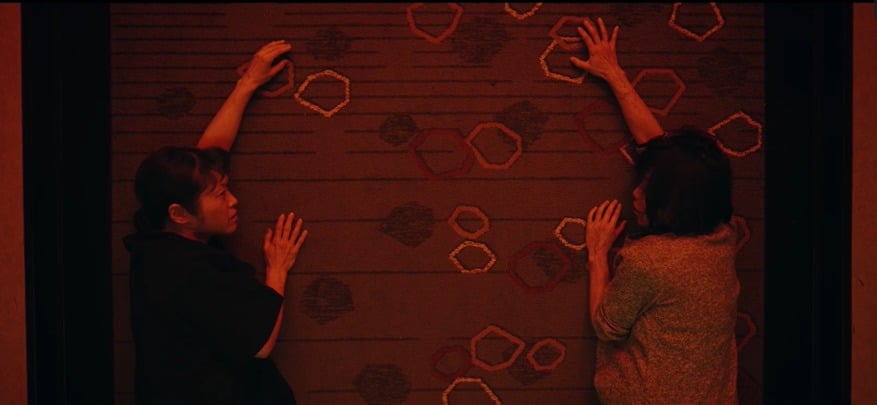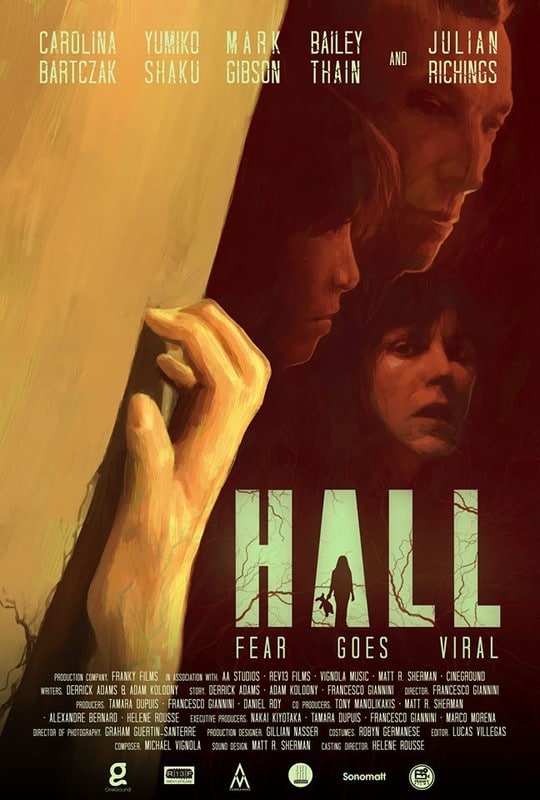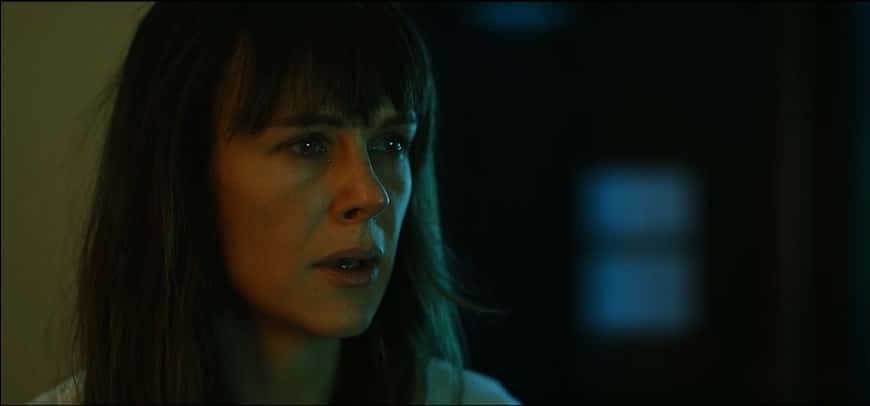
I’ll be honest; I’ve been dreading the inevitable ‘lockdown horror’ boom, and it’s something which is already happening: bored folks with cameras riffing on ideas about coronavirus is unlikely to bring us too many in the way of classics. Happily, Hall (2020) is not of this stripe. It’s born of coincidence rather than opportunism, a film which happens to ponder the implications of a widely-spreading virus, via the microcosm of a handful of well-drawn characters. One or two puzzling moments aside, this is a successful and tense affair which achieves a great deal with a tiny cast and limited set. It may well benefit, in some respects, by getting its release midway through a real pandemic, but it would just as easily stand on its own had it appeared a year earlier.
We start in a hotel corridor, the camera shot fixing on a young woman fighting for breath, evidently suffering from some kind of illness; an arresting, oh-so-slow pan across the rest of the hall reveals other sufferers. It seems, given that life seems to have ceased to be normal very rapidly, that this outbreak happens fast and very violently. The action skips back in time by a mere four hours: a young family, father Branden (Mark Gibson), mother Val (Carolina Bartczak) and eight year old daughter Kelly (Bailey Thain) are listening to news on the radio of a fast-spreading new strain of flu. Deep in conversation, they almost hit a woman crossing the road: and here’s our first link-up; it’s one of the sufferers from the hotel corridor. Val’s efforts to apologise to this woman prompt her to help the heavily-pregnant woman up to her room, as they’re checking in to the same place. A quick faux pas on Val’s part reveals that the woman, Naomi (Yumiko Shaku) has left her partner; it’s a situation Val can identify with, as Branden soon reveals his passive-aggression. Did I say passive-aggression? Add aggression-aggression to that. Unsurprisingly, Val has escape plans of her own – and so a horrendous situation, for two individual women, is about to be placed under the additional, extraordinary pressure of a particularly virulent outbreak of disease.

There really is a lot to commend here. This is a visually-attractive film which blends its contrasts: the soft light of the hotel rooms shifts to close-ups on worried, pained, lined faces; in its meanings, too, the hotel shifts from a sanctuary to a gaol, and not always necessarily under the sway of the virus. Comfort begets confinement. And misery is layered on misery here; as much as I tire of the ‘pregnant woman’ motif as a shortcut to generating concern about female characters, Naomi has enough about her to make her sympathetic. Likewise, Carolina Bartczak does an extraordinary amount with what she’s given, and in both of these cases, troubling backstories are interwoven with the horrific, unflinching present. Men in this film – both present and absent – are the worst of their kind, all ego, narcissism and the steady drip, drip, drip of control. Without a virus, this is still unsettling stuff. The disappearance of Val and Kelly from the present moment in the film is surprisingly affecting; the writing and direction of the film does enough to make us care. Perhaps the little girl’s ebullience is a little hard to believe given everything taking place between her parents, but then kids are as capable of masking their feelings as adults.
The virus itself is, for the most part, surprisingly ambiguous: although it looks nasty, it never segues into World War Z and it keeps things sober and sombre, by and large. (Where the action does take up a smattering of gorier, flashier moments, the film is the weaker for it, as it feels like tweaking a style of horror which needs no tweaking). Likewise, the underdeveloped character who appears and departs about midway through may add a layer to the plot, but I felt it was unnecessary. In the case of Hall, its psychological horrors are its key strengths.
Horrors about outbreaks are nothing new; perhaps we can appreciate them on a different level at the moment, but a good film of this kind will always stand on its own. Clearly, director Francesco Giannini, despite this being his first foray into the genre, has made the most of his extensive experience in film and created something definitely worthwhile for fans of slow-burn, subdued horror.
Hall (2020) will appear at the Blood in the Snow Film Festival at the end of October. For more information, please click here.
